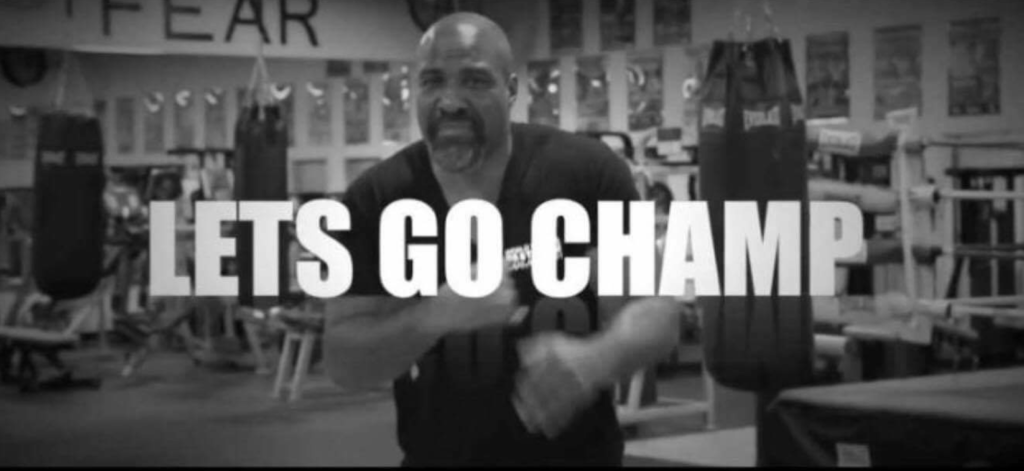“Let’s Go Champ!” – Positive Self Talk for Boxing

Over recent years, a lot of boxers have been more open to training their mindset, with a lot abiding by ‘The Secret’.
Many have adopted a mentality of ‘See, Believe, Achieve’ can lead to positive outcome. Training this mindset can be time consuming and not the most constructive as may not help during instant reactions during challenging situations, where our natural response is often a negative one.
In this article, we explain how boxers can become their own worst enemy through a negative mindset, and how boxers can use quick and easy positive self-talk methods to help improve performance.
Also we will take you through a psychological exercise to Managing Positive Self-Talk for Boxers.
Negative Self-Talk: You Are You’re Own Worst Enemy
Boxing can be a lonely sport, especially in the ring, where negative thoughts and self-doubt might creep in. Similarly, such thoughts might pop into the boxer’s head either before or during a training session or just before a big rep.
Such thoughts can be negative because of many reasons such as lack of confidence, past experiences, recent injuries or loss.
These thoughts can become destructive over time and affect the boxer’s performance. This is because negative thoughts can gradually lower the boxer’s self-confidence in their own ability.
So how can a boxer identify negative self-talk?
Negative self-talk can be distinguished by unrealistic or self-defeating statements such as “I’m going to fail for sure” or “I didn’t perform well, I’m no good”. These thoughts tend to creep up when a boxer is experiencing demanding tasks or hasn’t received the best feedback.
Negative self-talk can also lead to bodily changes such as increased heart rate and increased sweating, and so boxers who experience negative self-talk may also experience high levels of anxiety.

Although, it’s natural to experience negative self-talk and be critical of our own expectations, it’s important to realise when self-talk becomes detrimental.
Challenging negative self-talk
Challenging negative self-talk enables boxers to break down why negative self-talk has occurred. This also enables boxers to feel more positive towards demanding situations and to judge these situations in an optimistic and realistic manner.
It is also important to keep in mind that learning to dispute negative thoughts may take time and practice.
Challenging negative self-talk can gradually help to increase the boxer’s self-confidence towards a specific task (i.e. sparring). Once boxers have evaluated the reasons on why negative self-talk has occurred, they will start to realise how much of the negative thoughts were, in fact, inaccurate, exaggerated or only focused on the negative aspects of the situation.
Raising awareness of these thoughts is the starting point to fight off negative self-talk and to use these feelings as a cue to re-analyse the situation in a positive way.
Positive self-talk
One way of re-analysing the situation would be to replace the negative thoughts with positive and motivating self-statements. Firstly, it’s important to recognise the build-up of negative thoughts and identify where in training or competition these thoughts have developed.
Secondly, it’s important to prevent these thoughts from accelerating to more damaging thoughts. So, boxers must become aware their self-talk during demanding situations.
Finally, replacing these statements with positive cues is crucial. For example, if a boxer thinks “I can’t last the final round”, that’s a clear sign of negative self-talk. But re-analysing the situation and replacing these negative cues with optimistic statements such as “This is my last round, I’m going to give it my all” will motivate the boxer to perform to the best of their ability.
Positive self-talk can, therefore, help to enhance performance and self-confidence and help to maintain an optimistic mind frame.
Let’s Go Champ
The famous catch-phrase “Let’s go champ!” is a great example of using positive self-talk by Shannon Briggs. No matter how long or short the catch-phrase, as long as it’s positive it will be effective.
Floyd Mayweather’s “Hard Work, Dedication” and Pacqiaou’s “Manny Knows” are other examples.

Another way for boxers to re-analyse the situation would be to implement self-talk techniques in training.
The boxers can do this through keeping a record of their self-talk in a our psychological exercise…
Psychological Exercise – Managing Positive Self-Talk for Boxers
This is taken Self-talk logbook written by Shakiba Moghadam. The logbook strategy aims to improve the boxer’s appraisal of difficult situations and help them recognise negative self-talk.
The logbook also allows boxers to note down when the negative self-talk started to creep in, what statements were thought of, andhow these statements affected the boxer’s thoughts, emotions, and performance.
The logbook should be used immediately after training to avoid misinterpreting self-talk or forgetting what was thought of. As previously mentioned, by analysing where self-talk may have occurred the boxers will be able to replace negative self-statements with more positive statements.
The logbook should be used for at least 6 weeks to allow time for evaluation of the boxer’s progression.
The implementation of the logbook strategy can be used with any age group at any given time in the boxer’s boxing career.
We all have inner demons. Don’t let negative thoughts get in your way.
Three Steps to Enhancing Positive Self-Talk

1. Replace negative self-talk with positive statements.
We will provide some examples, however you should find your own psychological cues to respond positively to. Replace the following statements with the first positive statements that come to mind:
“I can’t run the last rep”
Example Replacement:
Dominate the rep and win the session
“I’m giving up, I’m having a terrible spar”
Example Replacement:
Try to win on my worst day
“My opponent is taller than me and will outpoint me”
Example Replacement:
Make every disadvantage, my own advantage
“My opponent is better and more experienced, I may lose this one”
Example Replacement:
The better the opponents bring the best out of me
“I’m feeling tired for sparring, my legs are heavy”
Example Replacement:
This is a result of hard training, and will pay off come fight night
There are a few examples, feel free to use these or use our own cue to achieve a positive mindset.
2) Facing a negative situation with a short positive cue
This can help you combat difficult situations before a negative outcome occurs. We have we have provided some examples of situations and positive psychological cues, but we encourage you to find your own cues to use.
Feeling extremely tired in the last round of a boxing bout
Example Cue:
The last big push
Receiving criticism from your coach during sparring
Example Cue:
This will make me better
Not hitting ‘the numbers’ during training
Example Cue:
Not going to be 100% everyday
Feeling tired / groggy before the session
Example Cue:
Get the job done
Working in the red zone
Example Cue:
This is what separates me from the rest
You’re losing a bout
Example Cue:
Ain’t over until it’s over
3) Reflect positively to a negative situation
Even the top boxers make mistakes and go off track just like everybody else; the difference is that they get back on track as quickly as possible.
This could be losing a fight/bout, having a bad spar or just a poor training session.
Every time you go off track or fail, in training or in sparring, make it a habit that you reflect on the situation with a positive mind set. This can be done by simply reminding yourself of certain words or phrases as suggested below.
This strategy will help to build a habit of keeping a positive mind set when placed in a demanding situation.
I’ll try harder next time
I’m improving myself
I’m becoming stronger
I need to make mistakes to learn from them
Let’s go I’ve got this
I know I’ve got it in me
I’ve got this far, I can push through it
I’ll come back stronger I know I can do this
Massive thanks to guest author Shakiba Moghadam for her original article in 2016.
Learn more about sport psychology for Boxing
We have a range of sport psychology workshops included in our Boxing Science Membership.
- Johnny Nelson – Champions Guide To Overcoming Adversity
- Dr. Pete Olusoga – Psychological
- Israel Halperin – Feedback for Boxing Coaches
Boxing Science Membership – £8.99 per month
Receive all of these workshop along with access to a range of coaching workshops delivered by Boxing Science and leading practitioners in Boxing and MMA. We started with 30 different workshops in S&C, Nutrition, Physiology and Psychology, with our collection of world-class content forever growing as we upload 2 more workshops every month.
Also, gain access to our exercise library with over 100 video demonstrations, as well as exclusive discounts on our programs and products.

Train Like A Champion Membership – £19.99 per month
Not only do you get access to all of the above, this upgraded membership gives you access to ALL of our Train Like A Champion Programmes – this will support you on your journey to world level fitness.

